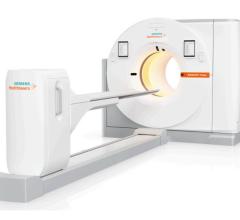February 3, 2009 - The National Comprehensive Cancer Network (NCCN) said it has made important updates to the NCCN Clinical Practice Guidelines in Oncology for Breast Cancer and Breast Cancer Risk Reduction.
These changes reportedly reflect leading developments in the treatment of patients with breast cancer and represent the standard of clinical policy in oncology in both community and academic settings.
Notable diagnostic additions to the NCCN Guidelines include a recommendation for genetic counseling if the patient is high risk for hereditary breast cancer, as well as six new recommendations detailing when MRIs may be helpful in breast cancer evaluations.
Conversely, the updated NCCN Guidelines for Breast Cancer state that PET/CT scanning is not recommended for evaluation of newly diagnosed patients with early stage disease except in those clinical situations where other staging studies are equivocal or suspicious, and even in these situations that biopsy is recommended. The NCCN Guideline Panel Members for Breast Cancer note that although there is limited evidence demonstrating the utility of PET/CT scan in the staging of patients, they consider biopsy to be more likely to provide useful staging information.
The updated NCCN Guidelines continue to recognize bisphosphonates as the preferred intervention to treat osteoporosis in women with breast cancer, while the use of estrogen, progesterone, or selective estrogen receptor modulators is discouraged.
Significant additions were also made to the portion of the NCCN Guidelines providing recommendations for patients undergoing breast reconstruction following surgery. It is now recommended that women receive an evaluation detailing the likely cosmetic outcome of a lumpectomy prior to the actual surgery. Furthermore, women who are not satisfied with the cosmetic outcome following completion of breast cancer treatment should be offered a plastic surgery consultation.
Notable additions to the NCCN Guidelines for Breast Cancer Risk Reduction include updates to two risk-reduction agents, tamoxifen (Soltamox, AstraZeneca) and raloxifine (Evista, Eli Lilly and Company). Tamoxifen is recommended for premenopausal women with a history of atypical hyperplasia to reduce breast cancer risk. For postmenopausal women, raloxifene is listed as equivalent to tamoxifen in reducing the risk of developing invasive breast cancer; however, it did not provide the same level of risk reduction for developing non-invasive breast cancer.
Breast cancer remains the second leading cause of cancer death after lung cancer in women in the United States. It is estimated that more than 180,000 new cases of breast cancer will be diagnosed in women in 2009.
NCCN Clinical Practice Guidelines in Oncology(TM) are developed and updated through an evidence-based process with explicit review of the scientific evidence by multidisciplinary panels of expert physicians from NCCN Member Institutions.
For more information: www.nccn.org


 July 24, 2024
July 24, 2024 








